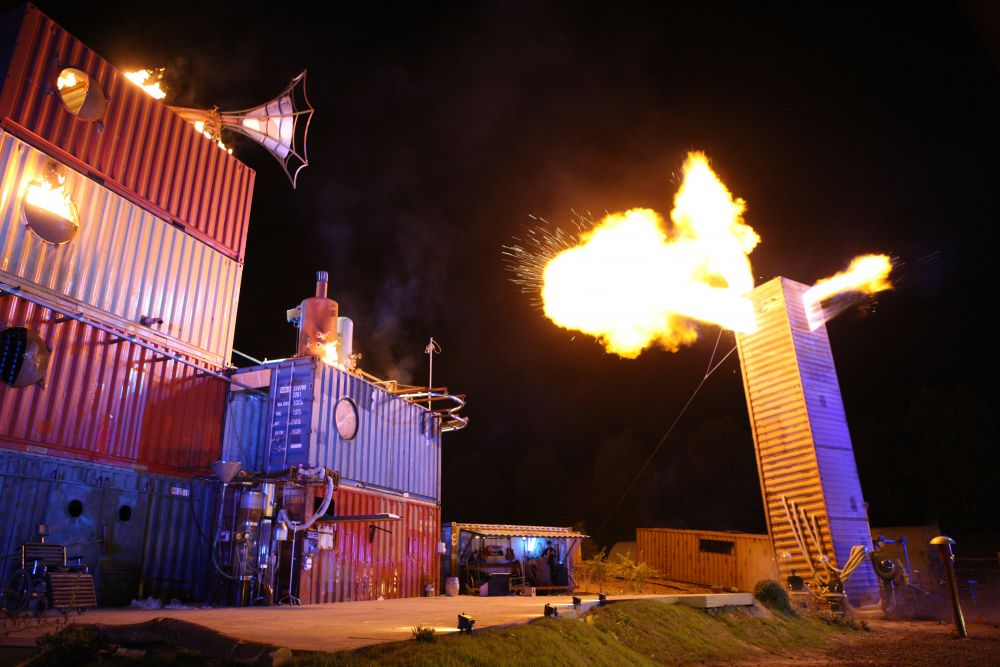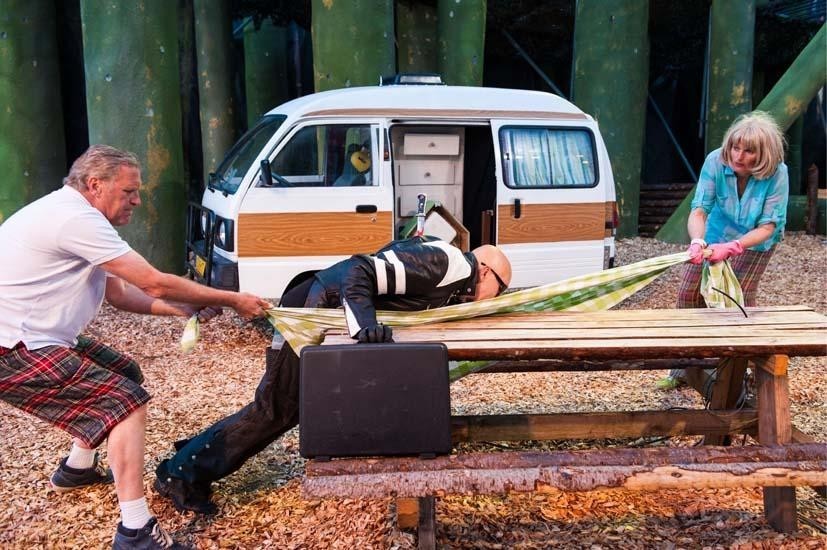Theatre group Vis à Vis, based at Almere Strand since 2007, has been around for 25 years. In all those years, the group has mainly made accessible, successful open-air theatre performances such as PICNIC, Silo 8 and HaRT. Visual comedies with lots of spectacle, where solid themes are treated in a light-hearted way. EXIT is their anniversary performance. A dozen questions to Arjan Anker, artistic director of Vis à Vis:
What does Vis à Vis bring to shows?
We don't shy away from tough dilemmas. We like to be current or even just ahead of the times. It has sort of grown that way over the years. Before, it was comedy and the form was important. And now that we have been around longer, we link it more to meaningful content to themes. That you are not only touched by the joke but also the theme it hangs on. It reinforces each other.
How committed is Vis à Vis?
The commitment is ambiguous. A performance should not become a moralising piece. We put things in perspective but invite the audience to think about the theme of the performance. That is the commitment. We are not do-gooders but also want to touch and engage people. Because more engagement gives more impact. This also has a theatrical argument.
How has Vis à Vis developed over the past 25 years?
Vis à Vis started with visual comedy which we then linked to social themes. And besides spectacle, our performances were given more stillness and poetic images. More contrasts, with big and small, for instance. In Silo 8 thundered sea containers burning while in another moment an elderly person has a tiny problem. You create suspense. In many ways, we started playing cinematically. First, Vis à Vis had performances with no or very little text. Text has now taken on a more important role. Not so much the driving force behind the story - that's the form - but it outlines the characters more and provides more of the plot.

Spectacle or emotion?
These reinforce each other. The poignancy can be sadness and then you go home feeling shitty. But better is inciting sadness with relief afterwards. To then go home happy, that's where great effects help. Things that sometimes can't be done, like flying in a boat in Silo 8. That gives breath to the story. Silo 8 does not end happily, rather beautifully. Vis à Vis does not want to be cynical because we want to appeal to a wide audience.
Vis à Vis got its own open-air theatre at Almere Strand. Comfortable?
This has been our regular venue since 2007 and we have been making outdoor performances here since 2010. First there was only an office and not yet a performance venue. Back then, we still made travel performances and education projects. It is comfortable here! The neighbours are not in our way. We have the space and there is a construction crane here. Also thanks to getting grants from the municipality, the province and the state.
With subsidy survive a wet summer when no visitors come?
The subsidisers did become stricter. Not that we have ever had problems with that but that was threatening to happen now. There are more requirements in terms of generating your own income. You have to have 30 per cent from your own sales. If you get more subsidy, you also have to sell more tickets. That always works out. But if the whole summer is rained out, you can shout that the stands are covered, but then the public still doesn't show up.
You (Arjen Anker), Marinus Vroom and Marianne Seine form the old core of Vis à Vis. How do you keep that up?
As long as we have inspiring topics. And if we get the slack when working out - we are also serious - then we'll be fine. Together, we throw ideas on the table. In that, we need each other to make a selection. You help each other to fine-tune an idea. And if someone else doesn't go along with an idea, we give up. No hard feelings.

Which performance do you remember fondly?
Geez, have to choose who's the cutest out of eighteen kids.... PICNIC remains fun; also for the audience. The form of this performance is so intriguing. It's actually two performances in one: one frontstage and one backstage. At intermission, you switch sides as an audience. There is a very clever build-up to it. It also doesn't matter where you start because all the surprises are revealed. You hear the other side laughing at the jokes you also saw before the break. In your imagination, you form a whole new story.
Which one less?
When I look back at our performances on video, some of them are just brilliant. Cult. For example, that was with the performance Zoom. That one was about roadside gnomes living under a highway trap rail. But when we Zoom played we did not get the connection with the audience. The jokes didn't fall right.
Are there any scenes that fail?
There are always scenes and things conceived behind the desk that look different in real life. But genius things can also emerge from other ideas that didn't work out.

What is Exit about?
Exit is about people's increasing capabilities in disposing of life and death. We are no longer close to being able to endlessly extend life. For example, you have the stem cell revolution where human ears are being placed on mice. Even there was talk of head transplantation in the news the other day. Similarly, you can make artificial life: cultured meat. You can also go too far in all these developments. Some risks are impossible to predict in advance. In EXIT there are two brothers who have a cultured meat factory. They are successful. An outside party is interested in their patents and the factory. The sale puts the interests of the factory on the line, but also the relationship of the two brothers.
How spectacular will EXIT be?
It is a law of nature that you cannot walk on water, but we have proved that you can. What you normally cannot do with water we manage to do. We make people disappear in water and defy gravity. I can give you a hint: we make water burn.
